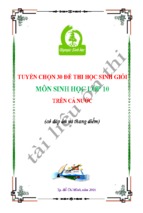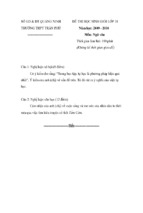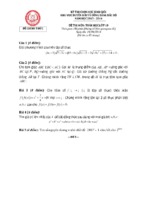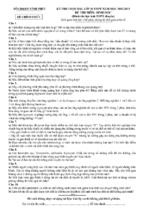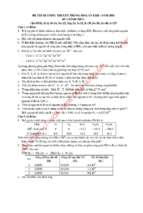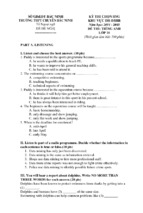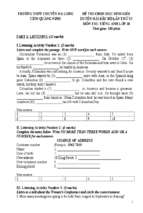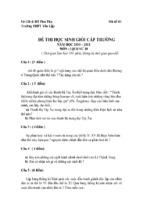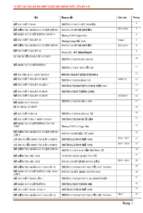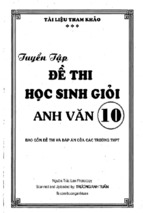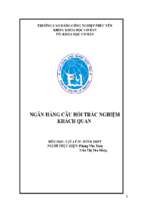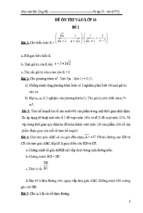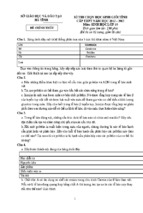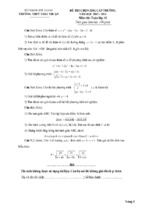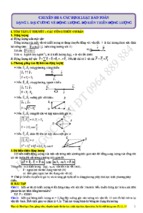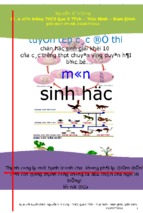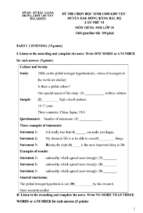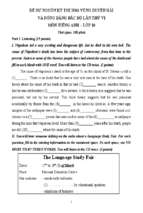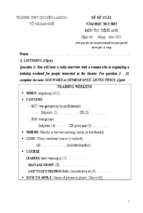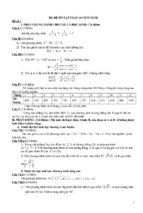SỞ GD&ĐT QUẢNG NAM
TRƯỜNG THPT CHUYÊN
NGUYỄN BỈNH KHIÊM
KỲ THI CHỌN HỌC SINH GIỎI KHU VỰC
DUYÊN HẢI & ĐỒNG BẰNG BẮC BỘ NĂM 2013
ĐỀ THI ĐỀ NGHỊ MÔN: TIẾNG ANH, LỚP 10
( Thời gian: 180 phút không kể thời gian giao đề)
PART ONE. LISTENING (15 pts.)
Section 1. Questions 1 - 10
Listen and complete the notes below. WRITE ONE WORD AND/OR A NUMBER
for each answer. Write your answers in the space provided. Be careful as you can
listen only ONCE. (5 pts)
COMPLAINT RECORD FORM
Example
Name:
Address:
Susan York
Flat 1___________________(1)
Harchester
Daytime telephone number:
Purchase reference number:
Date of purchase:
Item description:
HA6 5LD
0781 233 452
(2)___________________ 8443
15th January
Aqua Power shot digital camera in a
Insurance?
Details of complaint:
(3)____________________ colour.
Yes, has a (4) _________________policy
(5) __________________ missing should
be (6) __________________ but isn’t
(7)_______________ on case
Action to be taken
If repair not possible, offered to provide a
(8)__________________,
but
customer
requests a (9)__________________
Asked
customer
to
(10)__________________
1
send
item
to
Section 2. Questions 11 - 15
Listen and complete the notes below. WRITE NO MORE THAN THREE WORDS
AND/OR A NUMBER for each answer. Write your answers in the space provided.
Be careful as you can listen only ONCE. (5 pts)
11. The man is the ___________________ of Student Services at Radstock.
12. The ___________________ are all enrolled as students at the university.
13. The student discount cards allow students to save up to ___________________
percent when eating out.
14. Students interested in joining a club can sign up on weekday between
___________________ o’clock.
15. The man advises the students to ___________________ and employ themselves.
Section 3. Questions 16 - 20
Listen and choose the correct letter A, B , C or D. Write your answers in the space
provided. You are going to listen TWICE. (5 pts)
16. The students are meeting to __________
A. organize a party.
B. answer question about a course.
C. decided on their study.
D. make plan for their picnic.
17. Sonia and Mattheus__________
A. agree the teacher was flexible.
B. disagree about their teacher’s flexibility
C. didn’t like all of the discussions they had
D. found that their teacher was very strict.
18. The college offered __________
A. only morning classes
B. only evening classes.
C. both morning and evening classes.
D. only morning classes at weekends.
19. Sonia and Mattheus __________
A. want to study literature.
B. are both interested in psychology.
C. want to take a music course.
D. have different plans for their career.
2
20. Which of these was a problem with the campus library?
A. Books were not always available.
B. The people working there were unhelpful.
C. There were not enough computers.
D. The library was too noisy.
PART TWO. LEXICO – GRAMMAR (35 pts.)
Question 1. Choose the word or phrase which best completes each sentence. Write
your answers (A, B, C, or D) in the numbered boxes. (10 pts)
1. - "So, whose fault was it? Jane's or Brian's?"
- " .__________ fair, they were both partly to blame."
A. Being
B. To be
C. To have been
D. Having been
2. In my opinion, Brian’s too much young to get married. But what I think is _______
He never listens to what I say.
A. the sticking point
B. the turning point
C. a sore point
D. beside the point
3. He still suffers from a rare tropical disease which he _______ while in Africa.
A. infected
B. complained
C. gained
D. contracted.
4. We sold our house _______ a profit; we made £2,000.
A. at
B. with
C. by
D. in
5. As soon as Dad _______ we can leave.
A. has the car starting
B. has got the car started
C. got started the car
D. was got starting the car
6. There’s no point in telephoning him. He’s certain _______by now.
A. to leave
B. to have left
C. left
D. having left
7. She gave up nursing training when she found she had no _______for looking after
the sick.
A. vocation
B. mission
C. service
3
D. ambition
8. We are pleased to announce that Keith Danish ………… replace Susan Williams as
Operations Manager from 24th September.
A. does
B. is to
C. is about to
D. is due
9. He was ………. a mile of the hotel when he ran out of petrol.
A. only
B. inside
C. within
D. hardly
10. There is no _______ for hard work and perseverance if you want to succeed.
A. alternative
B. substitute
C. imitation
D. equivalent
11. Why don’t you have a night out? It would _______ your mind _______ your worries.
A. take/off
B. take/out of
C. get/out
D. get/out of
12. We caught a momentary _______ of Prince Charles as his car drove past.
A. view
B. peep
C. glance
D. glimpse
13. If you _______too much of your energy on the climb, you’ll have none left for the
descent.
A. spend
B. lose
C. expend
D. invest
14. I’d say let’s meet on Sunday but I’m none _______ sure what’s happening at the
weekend.
A. so
B. too
C. very
D. that
15. Frankly, I don’t know how he _______ on the small amount he earns.
A. gets back
B. gets down
C. gets out of
D. gets by
16. Were you really just on the point _______?
A. of resigning
B. with resignation
C. to resign of
D. having resigned
17. You have managed to bungle every task I’ve given you so far _______I am
prepared to give you one last chance.
A. regardless
B. furthermore
C. nevertheless
D. notwithstanding
18. The case was _______ by the judge for the lack of evidence.
A. dismissed
B. disallowed
C. abandoned
D. discarded
19. I took a course in shorthand and typing with a (an) _______ to apply for a
secretarial job.
4
A. intention
B. project
C. view
D. purpose
20. The hotel room was _______ furnished with only a bed, a wardrobe, and an
ancient armchair.
A. thinly
B. sparsely
C. lightly
D. sketchily
Your answers:
1.
6.
11.
16.
2.
7.
12.
17.
3.
8.
13.
18.
4.
9.
14.
19.
5.
10.
15.
20.
Question 2. The passage below contains 10 errors. IDENTIFY and CORRECT
them. Write your answers in the numbered boxes. (0) has been done as an example.
(5 pts)
TAKE CARE IN THE SUN
The Sun should be enjoying but overexposure can cause sunburnt, leading
to mature skin ageing and increased risk of skin cancer. It is the ultraviolet
rays which cause this; even in the UK they can damage your skin, but UV
is much more powerful the nearer the equator you go. You must stay out of
the sun during the two hours around midday, use shade at other times, the
sun hat and tight woven but loose clothing. Protective creams suitable for
your skin type can help protect unavoidably exposing parts of the body. A
farther related risk is heart stroke, caused by overheating. Avoid strenuous
activity during the hot hours and make sure you drink plenty of nonalcohol drinks (best is water which has been boiled or soft drink from
sealed cans or bottles) to replace body fluid.
Your answers:
0. enjoying - > enjoyed
1.
2.
3.
6.
7.
8.
5
4.
5.
9.
10.
Question 3. Fill in each blank with a suitable PREPOSITION. Write your answers
in the numbered boxed. (5 pts)
1. She was very appreciative ____________all the support she got from her friends.
2. The price of shares in the company went up ____________over 50% when they
announced the discovery of the new oilfield.
3. The cinema which was adjacent ____________ the bank was badly damaged in the
earthquake.
4. My karate instructor always singles ____________Robert to demonstrate
techniques as he’s the best in the class.
5. You look really scruffy. Can’t you tuck your shirt _________your trousers at least?
6. Erica is an excellent colleague. She goes __________her job calmly and efficiently.
7. The baby has been acting ____________ all day. I think she must be teething.
8. His abstinence ____________ caffeine lasted only two months.
9. This watch used to belong to my great-great- grandfather. It’s been handed
____________ from father to son for five generations.
10. I’ve got to drive, so I think I’d better stick ____________orange juice, thanks all
the same.
Your answer:
1.
6.
2.
7.
3.
8.
4.
9.
5.
10.
Question 4. Use the correct form of each bracketed word in the numbered boxes.
Write your answers in the numbered boxes. (0) has been done as an example. (5
pts)
Organizing a holiday can be a very (0.CHALLENGE) __________ task.
Some people find the experience as (1. STRESS)__________ as the daily demands of
6
work and family (2. COMMIT) __________. If you are in this situation, you may
find that taking an escorted holiday is the ideal (3. SOLVE) __________.
Escorted holidays offer a great balance between sightseeing, entertainment and
leisure time, with the added advantage that you have the services of a professional
tour manager, who (4. COMPANY) __________ you through the trip, acting as your
personal guide. From the first day to the last, tour managers make your holiday
experience even more (5. MEMORY) __________ because of the
(6.
VALUE)__________ information and helpful suggestions the provide. Your tour
manager will give you many (7. SIGHT) __________ into the place you are visiting,
including useful information on the (8. DISTINCT) __________ characteristics of
the place, such as regional food and local entertainment.
If you book one of the escorted holiday (9. PACK) __________that we offer,
you can be sure that you will have a (10. TRUE) __________authentic travel
experience.
Your answers:
0. challenging
2.
4.
6.
8.
10.
1.
3.
5.
7.
9.
Question 5. Read the passage carefully and fill in each gap with a suitable word.
Write your answers in the numbered boxes. (0) has been done as an example. (10
pts)
LOST LUGGUAGE
Approximately one airline passenger in every thousand arrives (0)__________
their destination to find that (1)__________ or all of their baggage has not arrived
with them. For many passengers this means a wait of hours or days, with all the
associated inconvenience, (2) __________the missing item is being located and
7
forwarded. Others, (3)__________fortunate still, have to resign themselves to the
fact that their bags are actually lost and, as the days turn into weeks, face the fact that
they are unlikely ever to see them (4)__________.
To prevent loss, (5)__________at least assist recovery, passengers are urged to
make sure that identification tags are secure and up-to-date, an itinerary with
addresses is enclosed and that bags are distinguishable (6)__________others of the
same make. Airlines recommend the use of colored tape or large elasticized straps
made specifically for this (7)__________
Lost or delayed luggage actually costs the world’s airlines over 6 billion
pounds per year. They get some of this back, however, by selling off those lost items
which are never claimed by (8) __________ rightful owners (9)__________months of
intensive tracking, airlines send hopelessly lost luggage to companies which sort the
contents and then put them on sale at bargain prices. At one such company in
Alabama, the leftovers of flying are laid out in a vast stone, (10)__________ has itself
now become an attraction for tourists from all over the world. Who knows, they may
even come across some of their own stuff.
Your answers:
0. at
1.
2.
3.
4.
5.
6.
7.
8.
9.
10.
PART THREE: READING (30 pts)
Question 1. Read the text below and decide which answer (A, B, C or D) best fits
each gap. Write your answers (A, B, C or D) in the space provided below. There
is an example at the beginning (0). (10 pts)
A community choir
8
Open Voices is a community choir based in the town of Kingston, in Ontario, Canada.
It was founded last year by a man called Andy Rush, an accomplished musician with
a 16-year (0)
B
record as a choir director.
Andy began by searching the way other community choirs were (1) _________,
before deciding on the (2) _________ he wished to use for his own choir. He then
advertised for people to come and try out the choir. There were no auditions and a (3)
_________ in music was not necessary. The purpose of the trial session was simply to
give people the opportunity to sing in a choir and get a (4) _________ for the
experience before making any (5) _________ to it. In order to overcome the barriers
that can prevent people joining groups like this, he provided transportation, childcare,
and subsidized membership fees for those who needed them. His goal was to make
Open voices inclusive and welcoming, and to (6) _________ people from a variety of
musical, cultural and social environments.
Andy expected 50 or 60 responses to his advertisement. In the event, 279 people (7)
_________an interest in joining the choir. In order to (8) _________ everyone, the
choir had to be (9) _________ into two groups, each one rehearsing on a different
day. Open Voices has now held several (10) _________ successful concerts and has
many more planned for the future.
0. A. course
B. track
C. path
D. line
1. A. set down
B. set off
C. set up
D. set on
2. A. guide
B. model
C. sample
D. pattern
3. A. backup
B. backdrop
C. background
D. backlog
4. A. touch
B. mood
C. sense
D. feel
5. A. commitment
B. allegiance
C. dedication
D. assurance
6. A. catch on
B. pull up
C. take out
D. bring in
7. A. suggested
B. expressed
C. described
D. conveyed
C. arrange
D. maintain
8. A. accommodate B. contain
9
9. A. torn
B. cut
C. sliced
D. split
10.A. fully
deeply
C. highly
D. greatly
0
B
1
2
3
4
5
6
7
8
9
10
Question 2: Read the following magazine article and choose the correct answers
to the questions that follow. Write your answers (A, B, C or D) in the space
provided below: (10 pts)
Clothing is a distinctly human artifact. Even more than the use of tools, it
distinguishes humans from the other creatures on this planet. While there are other
creatures which use implements to a greater or lesser degree, clothing is unique to
humanity. Clothing is also uniquely human, in that it serves more than one function.
The basic purpose of clothing was utilitarian. By putting on an artificial skin,
humans were able to move into regions for which they would otherwise have been
unsuited. An extreme example of this use of clothing can be seen among the Eskimos,
and other people who live in extreme climates. However, clothing was not only used
for protection from the elements, but has also been a means of displaying one’s status
and sense of style for as long as humans have had civilization. Thus clothing also
developed in countries where there is no real practical need for it, apart from the
other, every human function of preserving the modesty of the wearer.
Clothing tells us many things about the wearer. It can be used to indicate
whether she is a member of a particular group or organization, the most extreme
example of this type of clothing being a uniform. It tells us a lot about the importance
of clothing that the clothes a person was wearing have been, literally, the difference
between life and death. In war, solders recognize friends and enemies by their
uniforms. Spies may be shot if captured, but if they go about their business in the
uniform of their country, they are regarded as legitimate members of that country’s
armed forces.
10
Uniforms can also be less formal. Anyone who has seen a group of teenagers
walking together will have noticed that their clothing conforms to the standard set by
their particular group. Nor are teens the only ones who are subject to such pressure. It
is a rare businessman who does not feel the need to wear a suit and a tie. Most
politicians also try to be neat and well-dressed. People who wish to impress others
often do so by the selection of their clothes – sometimes by choosing more expensive
versions. This can be seen particularly in the fashion industry, where clothing by a
particular designer fetches prices which are out of all proportion to the actual
utilitarian value of the material.
Therefore, even thought we are steadily managing to adjust our
microenvironments to temperatures which are as close to ideal as the human body
wants, and even though sexual taboos of undress are being steadily eroded, it is highly
unlikely that there will be no use for clothing in our future, unless humanity evolves
into c completely new species.
1. Clothes are uniquely human because they ____________
A. are artifacts
B. have many different functions
C. are made by tools
D. are worn when they are unnecessary
2. The author thinks that ____________
A. clothing is an implement
B. there is no real need for clothing in some countries
C. clothes are principally for protection from the weather
D. people will always wear clothes
3. Which of the following does the author NOT give as a function of clothing?
A. To show how wealthy or powerful the wearer is
B. To show the wearer’s taste
C. To adjust our micro-environment
D. To avoid indecency
4. According to the article, uniforms ____________
11
A. are mainly worn by soldiers
B. have many functions
C. show membership of a group
D. are always worn by teenagers
5. In paragraph 3, the word “captured” closely means _____________
A. recognized
B. returned
C. arrested
D. trapped
6. Which of the following groups of people do not necessarily dress formally?
A. business people
B. teenagers
C. politicians
D. soldiers
7. The author suggests that fashion in clothing ____________
A. is ridiculous
B. is a part of its social function
C. is used to show membership of a group. D. makes clothes too expensive
8. Teenagers wear very similar clothing to their friends ____________
A. because they have the same climate
B. to avoid looking different from the others
C. because of sexual taboos of undress
D. to display their status and style.
9. In future, clothing will ____________
A. be worn by other species
B. be steadily eroded
C. be less needed for its original function
D. become ideal for the needs of human body
10. What might be suitable title for the article?
1
A. The function of clothing.
B. Clothing as fashion.
C. The future of clothes.
D. The story of clothes.
2
3
4
5
6
7
8
9
10
Question 3: Reading the text and match the headings (A – G) with the
paragraphs (1-5). Write your answers in the space provided below. There is one
heading that you don’t need to use. (0) has been done as an example. (5 pts)
A laying the foundation
12
B An inflexible approach
C Controversial decisions
D A man before his time
E A great incentive to achieve
F Evidence of a more liberal attitude
G Moving with the times
0.
D
In the latter years of the 19th century, Joseph Pulitzer stood out as the very
embodiment of American journalism. Hungarian-born, an intense indomitable figure,
Pulitzer was the most skillful of newspaper publishers, a passionate crusader against
dishonest government, a fierce, hawk-like competitor who did not shrink from
sensationalism in circulation struggles, and a visionary who richly endowed his
profession. His innovative New York World and St. Louis Post-Dispatch reshaped
newspaper journalism. Pulitzer was the first to call for the training of journalists at
the university level in a school of journalism. And certainly, the lasting influence of
the Pulitzer Prizes on journalism, literature, music, and drama is to be attributed to
his visionary acumen.
1._______ In writing his 1904 will, Pulitzer left $2 million to Columbia University
for the establishment of a School of Journalism. He also made provision for the
establishment of the Pulitzer Prizes, specifying the number and types of awards, but
giving the body which awarded the prizes, later renamed the Pulitzer Prize Board, the
power to increase the number of the prizes and also to withhold any ward where
entries fell bellow its standards of excellence. And indeed, over the years, the board
has increased the number of awards to 21, introducing prizes for poetry, music, and
photography.
2._______ In 1997, the 150th anniversary of Pulitzer’s birth, two fundamental
adjustments were introduced. In recognition of the growing importance of online
journalism, the submission by newspapers of online presentations was allowed. The
13
other major change was in music, a category added in 1943. Until then, the prize had
always gone to composers of classical music. The Board decided to broaden the
definition and entry requirements to bring mainstream music into the process. Thus,
in 1997 the prize went to Wynton Marsalis’s Blood on the Fields, which has strong
jazz elements. The Board also acknowledged previously overlooked George
Gershwin and Duke Ellington.
3._______ Similarly in literature, the board has grown less conservative over the
years in matters of taste. In 1963 Edward Albee’s Who’s Afraid of Virginia Woolf?
was believed to have too many allusions to sex and too rough dialogue to receive the
prize. Yet, in 1993 the prize went to Tony Kushner’s Angels in America: Millennium
Approaches, a play that dealt with problems of homosexuality and AIDS and was full
of obscenities.
4. _______ Over the years the Pulitzer board has at times been targeted by critics as
the prize was hardly ever in tune with popular inclinations. Many, if not almost, of the
honored books have not been on bestseller lists, and many of the winning plays have
been staged off-Broadway or in regional theaters. In journalism, the major
newspapers such as The New York Times, The Wall Street Journal, and The
Washington Post, have harvested many awards, but small, little known papers have
also been recognized for exposing corruption.
5._______ Announced each April by the president of Columbia University, which
Pulitzer established as the seat of administration for board, the prizes are regarded as
the highest national honor that can be bestowed in newspaper journalism, literary
achievement and musical composition. As such they are perceived as a major
encouragement for high quality journalism and art, focusing worldwide attention on
American achievements in letters and music.
0
1
2
3
14
4
5
D
Question 4. Read the text carefully, then choose from the sentences A-G the one
which fits each gap (1-5). Write your answers in the space provided below. There
is one extra sentence which you do not need to use. (0) has been done as an
example. (5 pts)
A. It avoids wasting time learning the same information twice, and is also a good way
of keeping your mind focussed on the task.
B. This is because they have invented a personal meaning for each one.
C. These will be easier to memorise than individual digits because there are fewer of them.
D. Nevertheless, an improved memory is certainly very valuable to people involved
in academic study.
E. To recall the names later, you simply follow the same route in your mind.
F. The same thing happens with spelling: most people repeat the same mistakes.
G. For less obvious names, you'll have to get more creative.
Memory isn't like a muscle, something I specific you can exercise. It's a way of
organising information in your brain. So to improve your memory, you need to
change and reorganise the way you think and this will help to support how your
memory works.
Short-term memory is limited, and most people can only remember about seven
items (numbers, names, objects, etc.) at a time. So when given a string of numbers
to remember such as 123957001969, break it into chunks: 12 39 57 00 19 69 or
even 1239 5700 1969. (0)
C
. The chunks will be even more memorable if
you can attach a meaning to some or all of them. For example, you might be able to
link them to the age of someone you know, an address or a famous date (e.g. 1969,
15
the first moon landing). These linked meanings can then form a story to help
remember a really long sequence.
Another technique for memorising information relies on images. A classic way
of remembering a person's name is to try and imagine it (or something associated to
it) on the person's face. This is easy if you meet John Bridge: just imagine a bridge
on his face. (1) _______ Psychologists have found that the more unusual and vivid
the image is, the better it works.
In order to improve your ability to memorise random information, look for
meaning in everything - especially if you can refer it back to yourself. The human
mind has a particular fondness for meaning. A sequence of playing cards is difficult
to remember because the cards are essentially meaningless. And yet, some people
have trained themselves to memorise the precise order of every card in a pack, and it
only takes them a few minutes to do it. (2) _______
Make a mistake whilst learning something for the first time and you're more
likely to make the same mistake again. But get it right from the start and it'll stick.
This is called error-free learning. For instance, if you cycle to somebody's house for
the first time and you take a wrong turning, it is quite common that you will repeat
that mistake next time you go. This is because, when you 40 repeat the journey, you
recognise the route and the landmarks, and your brain will carry on misguiding you
until you realise that you are just remembering the things you did wrong last time!
It's not that your memory is poor but that it's misleading you. (3) __0_____. So if
you're learning something new, cut out all distractions; this will help you learn it
correctly first time.
In general, it is often better to test yourself on something you've learned than
to keep re-learning it. This is because while testing yourself, you can reflect on
your progress, check how well you have learnt things, and fill in the gaps rather
than re-learn everything again. (4) _______. This applies, for example, when you
16
are learning vocabulary in a foreign language. And finally, there is an excellent
technique for remembering facts, called the 'Roman Room' method. It's a
particularly good way of remembering a sequence of related information such as a
list of names, and it works like this. Choose a place you know well - such as your
home - and take a mental walk through the rooms. Then, put the names from your
list one by one into the rooms. Suppose you want to remember the names of your
friend's brothers and sisters in order of age. Visualise Harry, the eldest, in your
front room, then Sally the second in the back room. Molly, the third oldest, is in the
kitchen ... and so on. (5) _______ It seems a strange way of remembering, but with
practice it is very successful. It works because you are attaching new information
to something which is already very familiar and easy to recall.
0
C
1
2
3
4
5
PART IV: WRITING (20 pts)
Question 1: Finish each of the following sentences in such a way that it means
exactly the same as the sentence printed before it. (5 pts)
1. The students’ riotous behaviour should have been severely punished.
The students deserved__________________________________________________
2. The Prime Minister was determined to remain in office.
The Prime Minister had no ______________________________________________
3. There are more people out of work in this country than ever before.
Never _______________________________________________________________
4. I’m sure he took your briefcase by mistake.
I’m sure he didn’t _____________________________________________________
5. Provided your handwriting is legible the examiner will accept your answer.
So long as the examiner ________________________________________________
17
Question 2. For each of the sentences below, write a new sentence as similar as
possible in meaning to the original sentence but using the word given. This word
must not be altered in any way. (5 pts)
1. I managed to persuade Bob to lend me his car. TALK
I managed to ______________________________________________ me his car.
2. I go trekking now and again with my brother. ONCE
I go trekking ____________________________________________with my brother.
3. Most people seem to think that I will be next to be promoted. LINE
Most people seem to think that I _______________________________ a promotion.
4. He almost cried when you shouted at him. VERGE
He was _________________________________________when you shouted at him.
5. Nobody said they objected to the plan. OBJECTIONS
Nobody __________________________________________________ the plan.
Question 3. Paragraph writing (10 pts)
People listen to music for different reasons. According to you, why is music
important to many people? Write a paragraph (180 –200 words) to support your
ideas.
_____________________________________________________________________
_____________________________________________________________________
_____________________________________________________________________
_____________________________________________________________________
_____________________________________________________________________
_____________________________________________________________________
_____________________________________________________________________
_____________________________________________________________________
_____________________________________________________________________
_____________________________________________________________________
_____________________________________________________________________
18
_____________________________________________________________________
_____________________________________________________________________
_____________________________________________________________________
_____________________________________________________________________
_____________________________________________________________________
_____________________________________________________________________
_____________________________________________________________________
_____________________________________________________________________
_____________________________________________________________________
_____________________________________________________________________
_____________________________________________________________________
_________THE END________
KEY
PART ONE. LISTENING (15 pts.)
Question 1. Listen and complete the notes below. WRITE ONE WORD AND/OR A
NUMBER for each answer. Write your answers in the space provided. Be careful as
you can listen only ONCE. (10 qs) (5 pts)
1. Alpine Avenue
6. waterproof
2. DMX
7. (big) scratch
3. silver
8.replacement
4. Four Star
9. refund
5. Memory Card
10.Customer Services
Question 2. Listen and complete the notes below. WRITE NO MORE THAN
THREE WORDS AND/OR A NUMBER for each answer. Write your answers in
the space provided. Be careful as you can listen only ONCE. (5 qs) (5 pts)
19
11. director
12. receptionist staff
13. 35 (thirty five)
14. 10 and 3 (ten and three)
15. get involved
Section 3. Listen and choose the correct letter A, B or C. Write your answers in the
space provided. You are going to listen TWICE. (5 pts)
16B 17A 18C 19D 20A
PART TWO. LEXICO – GRAMMAR (35 pts.)
Question 1. Choose the word or phrase which best completes each sentence. Write
your answers (A, B, C, or D) in the numbered boxes. (5 pts)
1. B
2. D
3. D
4. A
5. B
6. B
7. A
8. B
9. C
10. B
11. B
12. A
13.C
14.B
15.D
16.A
17.C
18.A
19.C
20.B
Question 2. The passage below contains 10 errors. IDENTIFY and CORRECT
them. Write your answers in the numbered boxes. (0) has been done as an example.
(5 pts)
1. Sunburnt sunburn
2. Mature premature
3. but and
4. must should
5. the a
6. tight tightly
7. Exposing exposed
8. farther further
9. hot hottest
10. non-alcohol non-alcoholic
20
- Xem thêm -

